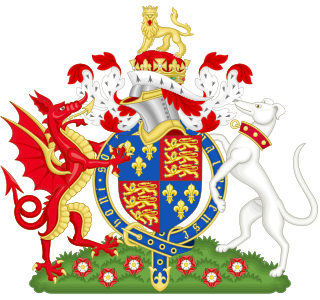
The Act of Uniformity 1662 is an Act of the Parliament of England. It prescribed the form of public prayers, administration of sacraments, and other rites of the Established Church of England, according to the rites and ceremonies prescribed in the 1662 Book of Common Prayer. Adherence to this was required in order to hold any office in government or the church, although the new version of the Book of Common Prayer prescribed by the Act was so new that most people had never even seen a copy. The Act also required that the Book of Common Prayer 'be truly and exactly Translated into the British or Welsh Tongue'. It also explicitly required episcopal ordination for all ministers, i.e. deacons, priests and bishops, which had to be reintroduced since the Puritans had abolished many features of the Church during the Civil War. The act did not explicitly encompass the Isle of Man.

A lord-lieutenant is the British monarch's personal representative in each lieutenancy area of the United Kingdom. Historically, each lieutenant was responsible for organising the county's militia. In 1871, the lieutenant's responsibility over the local militia was removed. However, it was not until 1921 that they formally lost the right to call upon able-bodied men to fight when needed.

The Ecclesiastical Licences Act 1533, also known as the Act Concerning Peter's Pence and Dispensations, is an Act of the Parliament of England. It was passed by the English Reformation Parliament in the early part of 1534 and outlawed the payment of Peter's Pence and other payments to Rome. The Act remained partly in force in Great Britain at the end of 2010. It is under section III of this Act, that the Archbishop of Canterbury can award a Lambeth degree as an academic degree.

The Act of Uniformity 1548, the Act of Uniformity 1549, the Uniformity Act 1548, or the Act of Equality was an Act of the Parliament of England, passed on 21 January 1549.

The Submission of the Clergy Act 1533 is an Act of the Parliament of the United Kingdom.

The Treason Act 1551 was an Act of the Parliament of England.

The Criminal Justice Administration Act 1851 is an Act of the Parliament of the United Kingdom.
Irish fisheries law is the fisheries law of Ireland. It relates to Irish fisheries.

The Ordinances of Corporations Act 1503 was an Act of the Parliament of England.

The Tithe Act 1536 was an Act of the Parliament of England.

The Distress Act 1554 was an Act of the Parliament of England.

The Ordination of Ministers Act 1571 was an Act of the Parliament of England. Its principal provision was to require clergy of the Church of England to subscribe to the Thirty-Nine Articles of Religion.

The Shop-books Evidence Act 1609 was an Act of the Parliament of England.

The Act of Uniformity (Explanation) Act 1663 was an Act of the Parliament of England.

The Billeting Act 1679 was an Act of the Parliament of England.

The Great Seal Act 1688 is an Act of the Parliament of England. As of 2020 section 1 of the Act is still in force in Great Britain.

The Savings Bank (Scotland) Act 1819 is an Act of the Parliament of the United Kingdom.

The Sale of Offices Act 1551 is an Act of the Parliament of England. The Act is concerned with corruption in public office. It has been repealed completely in the United Kingdom since 2013, but only partly in the Republic of Ireland, where it makes it an offence to sell certain public offices, or to receive or agree to receive money for an office.

The Bank of England Act 1694, sometimes referred to as the Tonnage Act 1694, is an Act of the Parliament of England. It is one of the Bank of England Acts 1694 to 1892.












